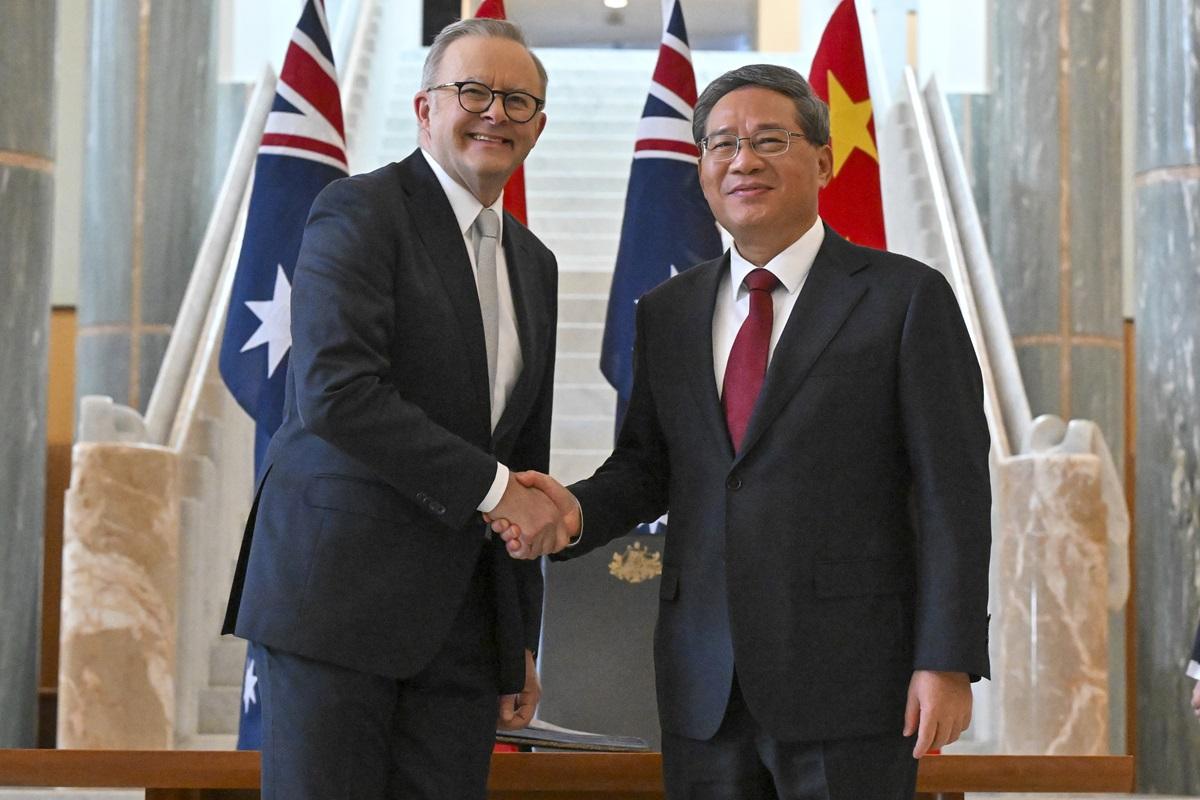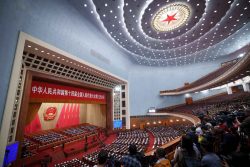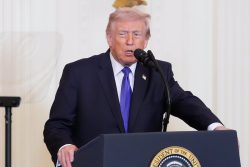
Chinese Premier Li Qiang and Australia’s Prime Minister Anthony Albanese shake hands at Parliament House in Canberra on Monday.
16:04 JST, June 17, 2024
MELBOURNE, Australia (AP) — Chinese Premier Li Qiang said he agreed with Australian Prime Minister Anthony Albanese on Monday to properly manage their nations’ differences as they emerge from a hostile era in which minister-to-minister contacts were banned and trade barriers cost Australian exporters up to 20 billion Australian dollars ($13 billion) a year.
Li, Albanese and senior ministers of both administrations met at Parliament House to discuss thorny issues, including lingering trade barriers, conflict between their militaries in international waters and China’s desire to invest in critical minerals.
Li, China’s most senior leader after President Xi Jinping, arrived in the South Australian state capital of Adelaide on Saturday and the national capital of Canberra late Sunday in the first visit to the country by a Chinese premier in seven years.
Li told reporters after Monday’s meeting that the bilateral relationship was “on the right track of steady improvement and development.”
“We … had a candid exchange of views on some differences and disagreements and agreed to properly manage them in a manner befitting our comprehensive strategic partnership,” Li said through an interpreter.
Albanese, who in November last year became the first Australian prime minister to visit China since 2016, described the discussions as “constructive.”
“Australia advocates that we should all work together to promote a regional balance where no country dominates and no country is dominated,” Albanese said.
“I’ve made it clear as nations with different histories, political systems and values, we will cooperate with China where we can, disagree where we must and engage in the national interest,” the Australian leader added.
Their relations have improved markedly since Albanese’s center-left Labor Party was elected in 2022 following nine years of conservative government in Australia.
Most of the official and unofficial trade barriers Beijing introduced in 2020 on coal, cotton, wine, barley and wood have been lifted since Albanese was elected.
Beijing had banned minister-to-minister contacts as it froze out the previous Australian government diplomatically.
Agriculture Minister Murray Watt said before the meeting that he would raise the issue of China’s ban on Australian rock lobsters and exports from two beef processing plants.
“The mere fact that we have the first visit by a Chinese premier, the second-most powerful person in China, … since 2017 is an enormous opportunity to continue that dialogue, to continue stabilizing our relationship and address some of the outstanding issues,” Watt said.
Li was served lobster at a business lunch with winemakers on Sunday and wagyu beef at a state lunch Monday, news media reported.
Li planned to underscore China’s interest in buying a bigger stake in Australia’s critical minerals sector, which is essential to the global transition to renewable energy sources, by visiting a Chinese-controlled lithium processing plant in Western Australia state Tuesday.
Li visited New Zealand before Australia and is scheduled to stop in Malaysia late Tuesday before returning to China.
Australia shares U.S. concerns over China’s global dominance in critical minerals and control over supply chains in the renewable energy sector.
Citing Australia’s national interests, Treasurer Jim Chalmers recently ordered five Chinese-linked companies to divest their shares in the rare earth mining company Northern Minerals.
Watt said Chinese investment was not banned from the sector, but must meet national security criteria.
Albanese later told Li at a state lunch, “We won’t always agree and the points on which we disagree won’t simply disappear if we leave them in silence.”
That appeared to be in response to a statement by Li, released by the Chinese Embassy in Canberra on Sunday, that he recommended “shelving differences” between the two countries in the interests of bolstering relations.
Albanese confirmed he had raised with Li recent clashes between the two countries’ militaries in the South China Sea and Yellow Sea that Australia argues endangered Australian personnel.
Chinese and Australian officials had agreed at the meeting to discuss improving military-to-military communications to avoid unintended incidents, Albanese said.
Relations tumbled over Australian legislation that banned covert foreign interference in Australian politics, the exclusion of Chinese-owned telecommunications giant Huawei from rolling out the national 5G network due to security concerns, and Australia’s call for an independent investigation into the causes of and responses to the COVID-19 pandemic.
Benjamin Herscovitch, a China expert at Australian National University, said he did not expect China to get any firm commitments from Australia during Li’s visit.
The two countries signed several agreements on Monday to cooperate on trade, education, climate change, culture and intellectual property.
Beijing would like to remove Australian opposition to China joining a trade bloc known as the CPTPP, more investment in Australian critical minerals and ambitious new cooperative agreements on science and technology, Herscovitch said.
But Australia had already made a concession to China in rebuilding relations through inaction by not imposing sanctions on Chinese entities that help Russia’s war effort in Ukraine, he said.
“Australia is essentially giving China a free pass on that issue,” Herscovitch said, while Australian allies, including the United States, Britain and the European Union were imposing sanctions.
Hundreds of pro-China demonstrators, human rights activists and democracy advocates have lined the routes of Li’s cavalcades in Adelaide and Canberra.
Top Articles in News Services
-

Survey Shows False Election Info Perceived as True
-

Hong Kong Ex-Publisher Jimmy Lai’s Sentence Raises International Outcry as China Defends It
-

Japan’s Nikkei Stock Average Falls as US-Iran Tensions Unsettle Investors (UPDATE 1)
-

Japan’s Nikkei Stock Average Touches 58,000 as Yen, Jgbs Rally on Election Fallout (UPDATE 1)
-

Japan’s Nikkei Stock Average Rises on Tech Rally and Takaichi’s Spending Hopes (UPDATE 1)
JN ACCESS RANKING
-

Producer Behind Pop Group XG Arrested for Cocaine Possession
-

Japan PM Takaichi’s Cabinet Resigns en Masse
-

Man Infected with Measles Reportedly Dined at Restaurant in Tokyo Station
-

Israeli Ambassador to Japan Speaks about Japan’s Role in the Reconstruction of Gaza
-

Videos Plagiarized, Reposted with False Subtitles Claiming ‘Ryukyu Belongs to China’; Anti-China False Information Also Posted in Japan



























